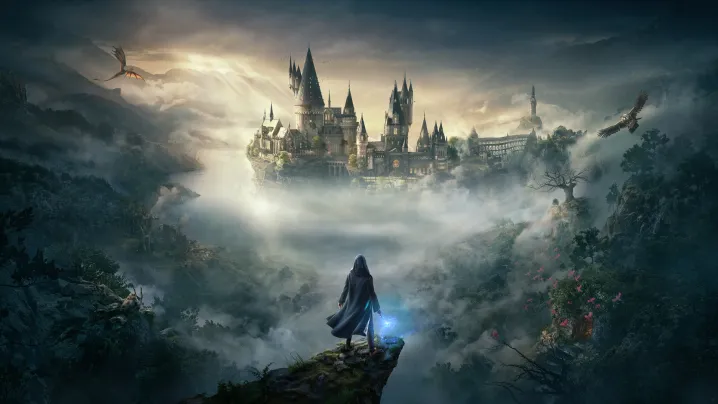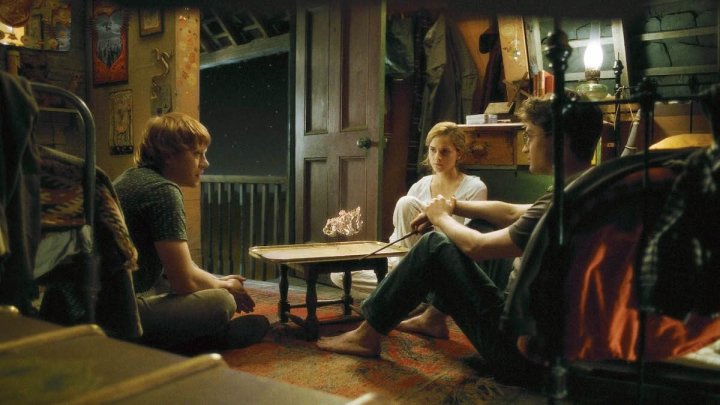Late on Monday afternoon, social media was set ablaze by the news that a new Harry Potter reboot was being discussed at Warner Bros. for HBO Max. The new series would adapt the seven books, one each season, offering another take on the Boy Who Lived’s story. As if that wasn’t bad enough, She-Who-Must-Not-Be-Named will be an active player on this reboot, ensuring it stays loyal to the source material despite not serving as either writer or showrunner.
The news comes as a shock because of its shamelessness. Does the Harry Potter series remain popular? Yes… to a point. Fans showed up for the wildly successful yet uneven Hogwarts Legacy but couldn’t be less interested in the ridiculously misguided Fantastic Beasts saga. The reunion special on HBO Max worked for, like, a day but quickly disappeared from the conversation. And Harry Potter and the Cursed Child keeps packing them in on Broadway and London’s West End, despite a mixed reception from fans. So yes, there’s money in the Wizarding World, but unfortunately, Warner Bros. seems wholly unequipped to handle the IP because it doesn’t understand why it worked in the first place.
Why Harry Potter worked in the first place

The Harry Potter series was a phenomenon in every sense of the word. It enthralled audiences of all ages, capturing the zeitgeist in a way few other literary properties have ever done. The books were massive, the films were record-breaking, and the euphoria over the Wizarding World was inescapable. There was a point when not liking Harry Potter made you uncool; everyone was in on it. It’s not an overstatement to say Harry Potter dominated the noughties — the saga defined the 2000s more than any other entertainment property.
But, like any other event in pop culture, it had to end sooner or later. And the Pottermania peaked in 2011 with the release of Harry Potter and the Deathly Hallows – Part 2, the final film in the series; from there, it was downhill. In hindsight, it’s impressive that Warner Bros. let five whole years pass before they attempted to revisit the Wizarding World. It isn’t, however, surprising that they did it via a quasi-prequel that rehashed what they believed worked from the Potter saga while misunderstanding the series’ main appeal.
In truth, the Potter series captured a very specific moment in time; it defined the millennial generation, made reading cool again, and revitalized the then-dying fantasy genre. Fans today will never know what it was to wait outside the library, of all places, to get the latest book and read it in one afternoon. Harry Potter came out before social media — before spoilers were so widely available and online discussion degenerated into toxicity. It was a product of its time, bridging the 20th century and the new millennium through sheer joy, wonder, and spectacle. But what made Potter unique in the 2000s is no longer exclusive to it today.
Audiences have the Marvel machine to satisfy their need for big-scale extravaganzas, and films like Dungeons & Dragons: Honor Among Thieves and the constant flood of Disney live-action adaptations keep the fantasy genre not only alive but thriving. It’s no wonder that TV adaptations of once-incredible fantasy properties don’t capture the zeitgeist as effectively as their big-screen counterparts — just look at The Rings of Power and His Dark Materials, two streaming properties based on beloved fantasy novels that failed to capture a mass audience.
In short, Harry Potter doesn’t satisfy any need in the market, nor does it cover any blind spot. It exists as a venerable relic of noughties culture. There isn’t a reason to bring Harry back now because his role has been fulfilled; the scar no longer hurts. The Boy Who Lived’s story will simply not shine as bright in today’s culture because he is no longer the only one who can razzle and dazzle. In a world of Doctor Stranges and Scarlet Witches, boy wizards like Harry Potter are just run-of-the-mill.
The Wizarding World vs. Harry Potter

If Warner Bros. should learn something from Hogwarts Legacy‘s considerable success is that fans want to see more of the Wizarding World, but that doesn’t mean they want more Harry Potter. They’ve seen his story and know how it ends. Once again, the studio misunderstands what makes its IPs so valuable.
Fans want to see more of Hogwarts, more of Hogsmeade, more of the vast world where magic runs rampant. They want dragons and giant squids and Quidditch! Some might even want more of the history that’s only been vaguely mentioned but never fully explored. It’s no wonder some think Hogwarts Legacy would’ve been a better TV show than a video game. Fans have been asking for more insight into the Wizarding World for years; for Warner Bros. to keep ignoring this is unexplainable. Because why do something new with the larger-than-life IP they have when they can rehash the same thing repeatedly?
The failure of the Fantastic Beasts saga must’ve convinced Warner that the Wizarding World can only work if Harry Potter is in it. However, Beasts failed spectacularly because it was an overly-convoluted, aimless, and terribly written story that wasn’t anything new; it was more of the same good-wizard-versus-evil-wizard stuff we had already seen, only this time, with less interesting characters. But have fans not been clamoring for a Marauders film or show? One about the Hogwarts founders? What about a Quidditch-centric property? The Wizarding World can exist without Harry Potter because it has outgrown Harry Potter. We don’t want any more Harry Potter because his story has nothing left to give. If anything, Hogwarts itself should be the Wizarding World’s new protagonist.
A very ugly shadow

Unfortunately, we can’t talk about Harry Potter without discussing J. K. Rowling. The author has become a real-life Bellatrix Lestrange, blindly committed to a bigoted cause and willing to die on that hill. Her comments become increasingly worse each day, and her willingness to alienate the fandom she spent years building is shocking.
There are real consequences to still having Rowling involved in this saga. For one, fans who staunchly oppose her bigoted views will refuse to return to the franchise — some might be lost forever, even if Rowling isn’t involved at all. Secondly, Rowling has proven incapable of separating herself from her creations, using Potter allegories to justify her narrow-minded views, thus soiling the series. Lastly, and more egregiously, Rowling’s work has aged like milk; from her questionable and, some might say, racist approach to POC characters to her outright lazy worldbuilding and confounding views on slavery, Rowling’s books are now supported by nostalgia more than quality.
Rowling has made herself the leader of the TERF movement, meaning her loyal audience is mainly conservatives opposed to what they consider “forced inclusion.” But the Harry Potter reboot will have substantial changes; how could it not? Cursed Child chose a Black actress to play Hermione, and Hogwarts Legacy included several POC characters, including a trans female. The reboot will surely try to make up for Rowling’s lazy worldbuilding and lack of diversity by including more characters that reflect the current world — if it doesn’t, it will be accused of perpetuating Rowling’s questionable legacy. However, doing so will also alienate the audiences that remain loyal to Rowling precisely because of this exclusionary legacy.
So who will the reboot be for? Certainly not for veteran fans — we already have the movies; we don’t want or need another version. Rowling’s fans will decry a show with a Black Hermione or a gay Dumbledore. And new audiences, who are surely the ones this reboot will try to attract, won’t be as passionate about it because it will be arriving to them as an afterthought, hand-me-downs from a previous generation that already made this series their whole personality.
Is the Harry Potter reboot dead on arrival?

It might be too soon to say a potential Harry Potter reboot will be a guaranteed failure, but things are not looking good. Chat on social media is quite negative, and Rowling isn’t doing herself any favors by proving herself incapable or unwilling to shut up. Add in the increasingly divided fandom and an audience becoming tired of Hollywood’s lack of originality, and you have a recipe for disaster.
A reboot will only succeed in further damaging the Potter brand. Warner Bros. is playing a dangerous game with one of its most prestigious IPs, one that will likely end badly for everyone involved. If the studio was smart — and by now, that is a pretty big “if” — it would buy Rowling out and build from Hogwarts Legacy, a title that proved successful enough to support a blossoming series. But the studio is in serious financial difficulties and struggling with the chaotic and unstable DC Universe; it makes sense for them to rely on something safe and with proven success.
But what is certain is that, if it does happen, this reboot will make or break the Harry Potter saga. Because it can either succeed and become what Game of Thrones once was for HBO — which, if we’re being honest, seems highly unlikely — or it can shine a light on everything wrong with Harry Potter and put Warner’s clumsy attempts to fix it in evidence. My guess is that the reboot will be a bizarre mix of pandering to new and more progressive generations while trying to somehow evoke the nostalgia veteran fans have, a weird Frankenstein that won’t satisfy anyone and will put the final nail in the Harry Potter coffin.
Editors' Recommendations
- The Magic Flute director Florian Sigl on making a Harry Potter-esque fantasy
- The best Harry Potter movies, ranked by Rotten Tomatoes
- How House of the Dragon saved Game of Thrones’ tarnished legacy
- Bye-bye, Batman: Caped Crusader. Animated series is no longer on HBO Max
- 10 best episodes from Batman: The Animated Series on HBO Max



